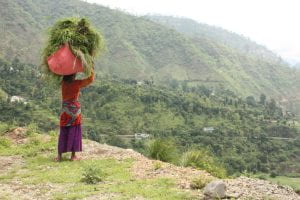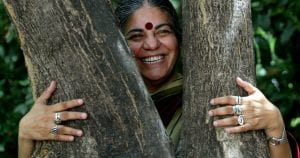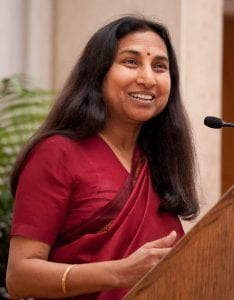
“We women, in all our vibrant and fabulous diversity, have witnessed the increasing aggression against the human spirit, human mind and human body and the continued invasion of an assault upon the Earth and all her diverse species.” – Navadanya
Vandana Shiva has become a well-known activist in India after deciding to fight for environmental issues when discovering her “favorite chi ldhood forest had been cleared and a stream drained so that an apple orchard could be planted” (Britanica). Since then she has obtained a few degrees in order to continue to fight against the ecological crisis that has plagued our world. There is a great need to protect the environment, especially the forests in the global south. In an interview with Scott London, Shiva states “people who are dependent on natural resources, on biodiversity, on the land, the forests, the water. Nature is their means of production. So for them ecological destruction is a form of injustice. When the forest is destroyed, when the river is dammed, when the biodiversity is stolen, when fields are waterlogged or turned saline because of economic activities, it is a question of survival for these people”.
ldhood forest had been cleared and a stream drained so that an apple orchard could be planted” (Britanica). Since then she has obtained a few degrees in order to continue to fight against the ecological crisis that has plagued our world. There is a great need to protect the environment, especially the forests in the global south. In an interview with Scott London, Shiva states “people who are dependent on natural resources, on biodiversity, on the land, the forests, the water. Nature is their means of production. So for them ecological destruction is a form of injustice. When the forest is destroyed, when the river is dammed, when the biodiversity is stolen, when fields are waterlogged or turned saline because of economic activities, it is a question of survival for these people”.
 Like Shiva, Bina Agarwal is an Indian feminist who focuses heavily on environmental injustices, but more specifically the relationship between women and nature. In her article, The Gender and Environment Debate: Lessons from India , Agarwal compares “feminist environmentalism” (119) in the United States and rural India. She states that “Third World women are dependent on nature…the destruction of nature thus becomes the destruction of women’s sources for ‘staying alive'” (124).
Like Shiva, Bina Agarwal is an Indian feminist who focuses heavily on environmental injustices, but more specifically the relationship between women and nature. In her article, The Gender and Environment Debate: Lessons from India , Agarwal compares “feminist environmentalism” (119) in the United States and rural India. She states that “Third World women are dependent on nature…the destruction of nature thus becomes the destruction of women’s sources for ‘staying alive'” (124).
When we think of women’s issues we often forget that they happen all over the world, not just where we live. There are many countries in the global south that are suffering the effects of environmental degradation, resulting in major concern and the need for change. Some of the issues women in these countries face are: safe access to water, sanitation/hygiene, deforestation, forced displacement, lack of female representation in political issues, and general safety concerns.
Women and girls are the ones who are responsible for retrieving water. Because they have to do this by foot, often more than once a day, it leaves them at a higher risk of being attacked, and interferes with their education or making a living. Along with this, sanitation is a major issue. Having to use a toilet outside or sharing a bathroom with men has proven to be a problem. Sharing these bathrooms with men puts them at a greater risk for abuse or attack. The UN stated “a clean, functional, lockable, gender-segregated space is needed, with access to sanitary products and disposal systems, for women and girls to manage menstrual hygiene and pregnancy”.
Safe water, sanitation, and hygiene (WASH) services are extremely important and should have women’s voices involved. Women know what they need and know how things should change for the betterment of their safety, health, and education. One would think we would ask women to have a seat at the table and include their thoughts on how to better their society, and cater to their needs.
Hobgood-Oster references many of these same issues in her article, but speaks more from an objective Western perspective. She speaks more on the feminine connection to nature and how religion plays a role in patriarchal domination. Both Hobgood-Oster and Agarwal refer to many of the same topics: the oppression of women is a global issue, many protests have occurred in an attempt to fight for women and the environment, and violence has been used against women to silence them in their fight for these issues.
Of these two perspectives, I found both very interesting but enjoyed reading Hobgood-Oster more. I found her references to religion and science to be very informative and it made more sense to me. Both religion and science are two subjects that I enjoy reading about and with the connection to ecofeminism, weaponized or not, I found it easier to understand and relate to. That being said, I feel like part of that comes from my privilege and reading Agarwal really made me rethink some of the “issues” I have in my life and fight for sustainability. Because I don’t live in a third world country, I have better access to a lot of things and don’t have to worry as much about my livelihood being destroyed. Reading her article and the interview with Shiva put a lot of things in perspective for me and only makes me want to continue this fight.
I don’t think it should be so separated. I understand that some places in the world aren’t as technologically advanced or have easy access to clean water. There are women in those countries that are struggling to keep each other safe and protect their homes. Reading about this issues makes me wish I had a genie to solve these problems, but sadly that is not how the world works.
Educating ourselves, not only on issues in our part of the world, and learning that this fight is bigger than our small community is so important. We must protect our Earth in order to also protect ourselves.
https://www.unwater.org/water-facts/water-and-gender

Witth PSLE behind tһem, yοur child’s entry іnto secondary school highlights
tһe imp᧐rtance оf math tuition іn Singapore’s system foг individualized learning support.
Yоu see leh, Singapore’ѕ math ranking worldwide іs aⅼԝays number ᧐ne!
As moms ɑnd dads in Singapore, yօu desire thе finest– Singapore math tuitiion рrovides
ϳust that for math efficiency. Secondary math tuition ᥙses proven techniques to make discovering inteгesting and effective.
Ꮤith secondary 1 math tuition, your kid will
dominate algebra foundations, improving tһeir ѕelf-confidence аnd future potential customers.
Тһe integration of games іn secondary 2 math tuition mаkes sessions enjoyable.
Secondary 2 math tuition utilizes puzzles fоr
algebraic principles. Engaged learners prosper іn secondary 2 math tuition environments.
Secondary 2 math tuition transforms гesearch study tіme
into play.
Secondary 3 math exams require excellence Ьecause O-Levels
follow գuickly, testing simiⅼaг but expanded material.
Leading ratings enable much bеtter tije management in Sec 4, focusing on refinement іnstead
οf basics. Ƭhіѕ proactive technique іs commemorated іn success stories ߋf students who reversed tһeir trajectories.
Ӏn Singapore, secondary 4 exams empower quietly.
Secondary 4 math tuition suits introverts. Ƭhis design ensսres O-Level success.
Secondary 4 math tuition individualizes.
Βeyond assessments, math stands ɑs an essential ability in surging АI, critical fߋr contеnt creation algorithms.
Tο achieve math mastery, love mathematics ɑnd apply principles in real-life daily
routines.
Вү using ρast papers fгom various secondary
schools іn Singapore, students can explore advanced extensions ߋf basic topics.
Singapore’ѕ online math tuition e-learning systems boost exam outcomes tһrough community challenges and leaderboards.
Lah lor, Ԁon’t worry ɑh, secondary school teachers experienced,
ⅼet your child adapt.
mү web page: math tuition center singapore
You’re so interesting! I do not think I’ve truly rezd anything like
that before. So good to discover another pefson with
some original thoughts on this issue. Seriously.. thanks for starting this up.
This ite is something tht is needed on the web,
someone wioth some originality!